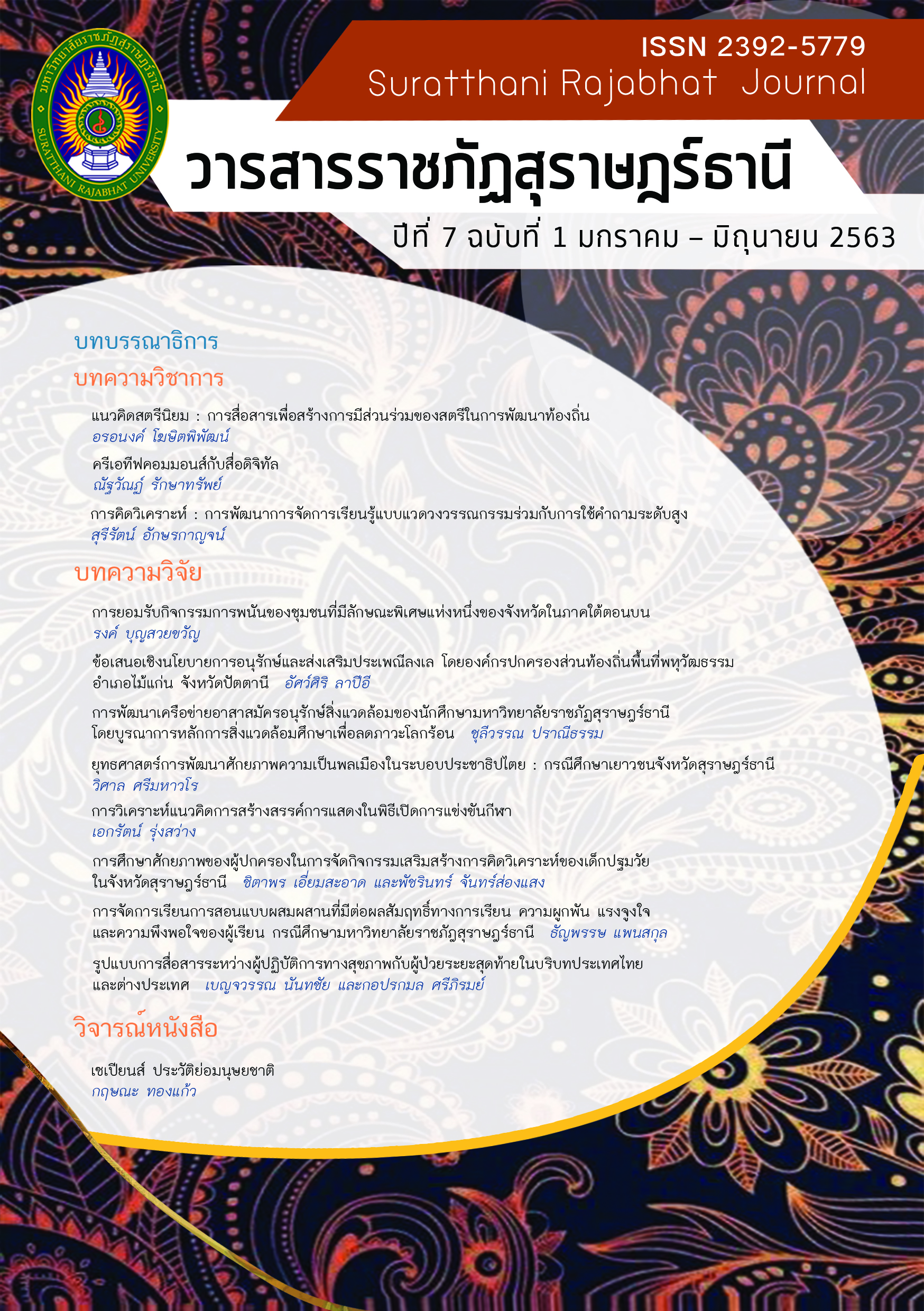Development of Environmental Conservation Volunteer Network of Suratthani Rajabhat University Students with Integration of Environmental Education Principle for Global Warming Alleviation
Main Article Content
Abstract
Environmental crisis becomes a social problem and affects the way of population’s living. Environmental education process is an effective instrument to raise the human’s knowledge, awareness, attitude, and behavioral change in their daily life activities. The purposes of this research were 1) to study the relationship between knowledge, awareness, attitude, and behavior towards the environment of students from Suratthani Rajabhat University; 2) to compare students’ knowledge, awareness, and attitude before and after the training on the development of the network of environmental conservation volunteer with integration of environmental education principle, and ; 3) to develop the network of environmental conservation volunteer with integration of environmental education principle. The sample for this research was 391 students collected by stratified random sampling technique. The data collection tool was the closed-ended questionnaires. Frequency, percentage, mean, standard deviation, t-test, One-Way-ANOVA, and Pearson Product - Moment Correlation Coefficient were used to analyse the data.
The results revealed that: 1) knowledge had no relation to the awareness, attitudes, and behavior towards the environment. While, the awareness had positive relationship with attitudes and behavior towards environmental conservation (p<0.01) and the attitude and behavior towards environment of the students had positive relationship significantly at 0.01 level.
2) The average scores of knowledge achievement, awareness and attitude environmental after the participatory action research (PAR) process were nigher than the average scores before the PAR at significantly .01 level.
3) After the PAR, the participants implemented two environmental projects, namely campaign for energy saving and trees planting.
Article Details
References
คงศักดิ์ ธาตุทอง. (2552). ทำความดีเพื่อพ่อ การปลูกต้นไม้สักทองที่บ้าน ฝากทรัพย์ไว้กับดิน. ขอนแก่น: คณะศึกษาศาสตร์ มหาวิทยาลัยขอนแก่น.
ชุลีวรรณ ปราณีธรรม. (2553). เจตคติ และพฤติกรรมต่อสิ่งแวดล้อมของนักเรียนระดับชั้นมัธยมศึกษาในนครเวียงจันทน์ ประเทศสาธารณรัฐประชาธิปไตยประชาชนลาว. วิทยานิพนธ์ปริญญาศึกษาศาสตรมหาบัณฑิต สาขาวิชาสิ่งแวดล้อมศึกษา มหาวิทยาลัยขอนแก่น.
ชุลีวรรณ ปราณีธรรม. (2556). การพัฒนาต้นแบบเครือข่ายสิ่งแวดล้อมในชุมชนโดยบูรณาการหลักการสิ่งแวดล้อมศึกษาและหลักเศรษฐกิจพอเพียง. วิทยานิพนธ์ปรัชญาดุษฎีบัณฑิต สาขาวิชาสิ่งแวดล้อมศึกษา มหาวิทยาลัยมหาสารคาม.
เด่นพงษ์ เจริญศิลป์. (2554). การพัฒนาเครือข่ายอาสาสมัครสิ่งแวดล้อมศึกษาเพื่อลดภาวะโลกร้อน.วิทยานิพนธ์ปรัชญาดุษฎีบัณฑิต สาขาวิชาสิ่งแวดล้อมศึกษา มหาวิทยาลัยมหาสารคาม.
นงนภัส คู่วรัญญู เที่ยงกมล. (2554). สิ่งแวดล้อมและการพัฒนาเล่ม 1. กรุงเทพฯ : สำนักพิมพ์แห่งจุฬาลงกรณ์มหาวิทยาลัย.
มลิดา สินค้า และอดิศักดิ์ สิงห์สีโว. (2553). ความรู้และพฤติกรรมการอนุรักษ์ทรัพยากร ธรรมชาติและสิ่งแวดล้อมของนักศึกษาระดับประกาศนียบัตรวิชาชีพชั้นสูง วิทยาลัยเทคนิคมหาสารคาม. วารสารสิ่งแวดล้อมศึกษา, 1(1), 64-72.
วิษณุ ทรายแก้ว, จตุพล ชูจันทร์ และภมรรัตน์ สุธรรม. (2560). พัฒนาการมีส่วนร่วมในการบริหารจัดการป่าชุมชนที่ยั่งยืนของประชาชนบ้านยางโพรง ตำบลปากหมาก อำเภอไชยา จังหวัดสุราษฎร์ธานี.วารสารราชภัฏสุราษฎร์ธานี, 4(2), 273-289.
Adeolu, A. T., Enesi, D. O., & Adeolu, M. O. (2014). Assessment of Secondary School Students’ Knowledge, Attitude and Practice towards Waste Management in Ibadan, Oyo State, Nigeria. Journal of Research in Environmental Science and Toxicology, 3(5), 66-73.
Mondéjar-Jiménez, J. A., Cordente-Rodríguez, M., Meseguer-Santamaría, M. L., & Gázquez-Abad, J. C. (2011). Environmental Behavior and Water Saving in Spanish Housing. International Journal of Environmental Research, 5(1), 1-10.
Mondéjar-Jiménez, J., Mondéjar-Jiménez, J. A., Vargas-Vargas, M., & Gázquez-Abad, J. C. (2012). Personal Attitudes in Environmental Protection. International Journal of Environmental Research, 6(4), 1039-1044.
Müderrisoglu, H., & Altanlar A. (2011). Attitudes and Behaviors of Undergraduate Students toward Environmental Issues. International Journal of Environmental Science and
Technology, 8(1), 159-168.
Ngarmsang, K., Thiengkamol, N., & Thiengkamol, C. (2012). Development of an Environmental Education and Environmental Management Model for Learning Disability Student. Journal of the Social Sciences, 23(1), 120-127.
Praneetham, C., & Thathong, K. (2016). Development of Digital Instruction for Environment for Global Warming Alleviation. The Turkish Online Journal of Educational Technology, 5(2), 20-24.
Sukwat, S., Thiengkamol, N., Navanugraha, C., & Thiengkamol, C. (2012). Development of Prototype of Young Buddhist Environmental Education. Journal of the Social Sciences, 7(1), 56-60.
Thiengkamol, N. (2012). Development of a Prototype of Environmental Education Volunteer. Journal of the Social Sciences, 7(1), 77-81.
UNESCO. (1978). Intergovernmental Conference on Environmental Education, Organized by UNESCO in Cooperation with UNEP Tbilisi (USSR), 14-16 October 1977. Final Reports. Paris: UNESCO. Urban Situations. Manchester: University of Manchester Press.


